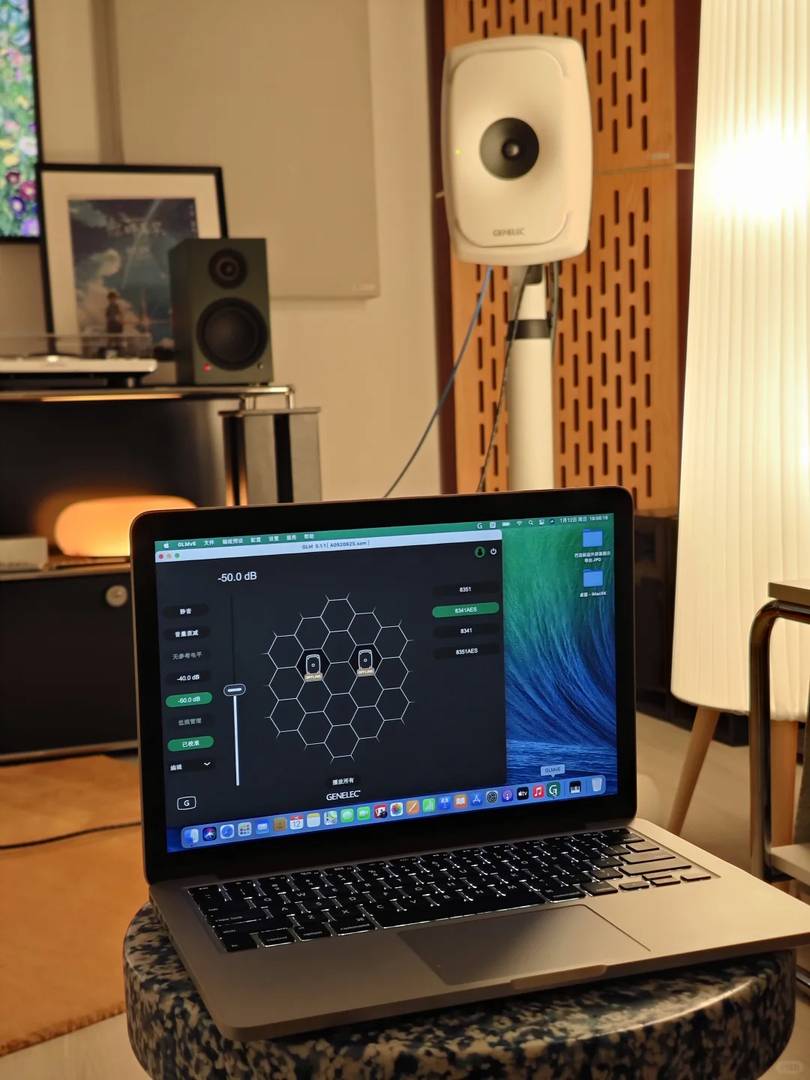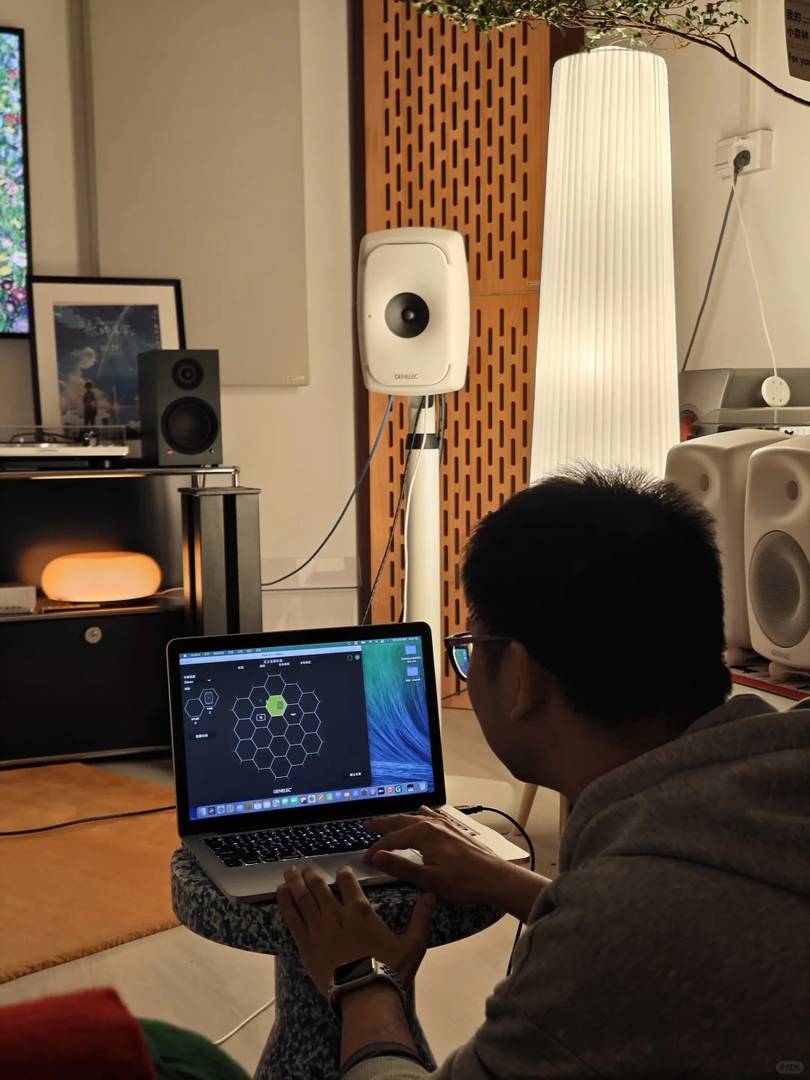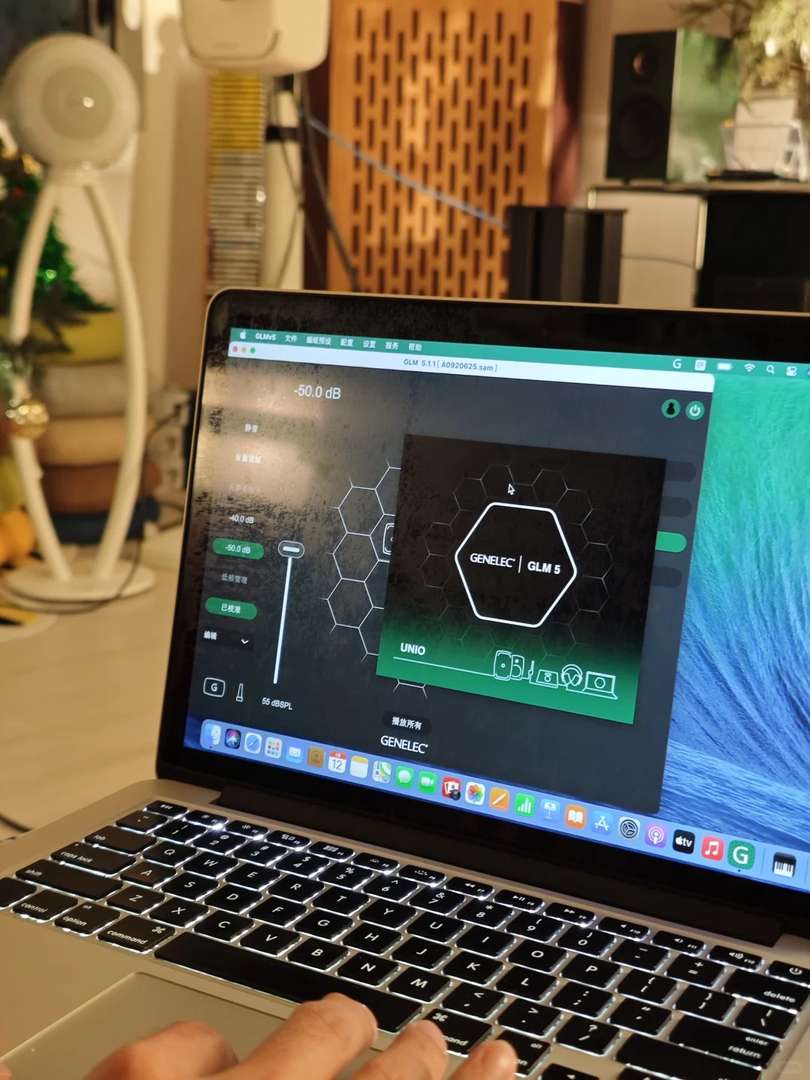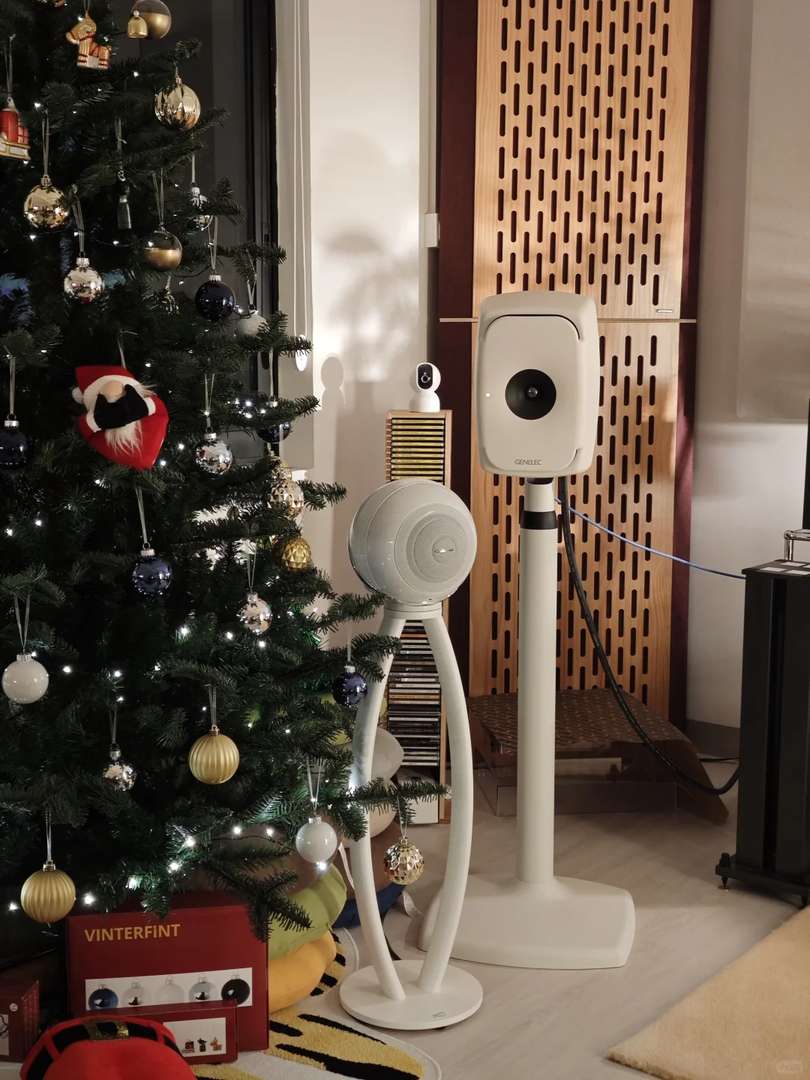How Does Genelec 8341 GLM Auto Calibration Work? First Impressions & Review
The room’s original acoustics had a noticeable peak around 44Hz.
After careful correction, the frequency response now sits perfectly flat.
The first impression? Crystal-clear transparency, like drinking pure spring water.
Adding the optical isolator took it further – the background became eerily silent, with noise and harshness virtually disappearing.
Some might dismiss it as “placebo effect,” but how can you judge without experiencing it firsthand? [Wink]

Now, about that common remark: “Genelec monitors don’t sound pleasant.”
Why would anyone use a “workbench” for enjoying music?

Here’s my perspective: Genelec isn’t designed to sugarcoat your music.
It’s a precision instrument – your trustworthy guide to discovering well-recorded albums and hearing music exactly as the artists intended.


I’ve been curious about the GLM Auto Calibration feature, and it sounds even better than I expected. That peak at 44Hz would drive me nuts, so it’s great to hear how well it smoothed out. The improvement in clarity and reduction of noise is impressive—definitely makes me want to try it myself!
That auto calibration feature sounds pretty impressive! I love how it flattened out those tricky low-end peaks. Once you hear the difference, it’s hard to go back. And the silence with the optical isolator? Next-level stuff.
Thank you for sharing your thoughts! Yes, the auto calibration really does an amazing job taming those tricky low ends. The silence with the optical isolator is indeed a game-changer—it adds such a peaceful focus to your listening experience. Thanks for appreciating the details—happy to hear it resonates with you!
I totally get why some people might initially dismiss Genelec’s sound as clinical, but after hearing their auto calibration in action, it’s hard to deny the clarity and precision. That said, I can see how the “placebo effect” comment could come up—it almost feels too good to be true until you experience it yourself. Still, the improvement in low-end response and overall silence in the background is undeniably impressive.
Thank you for sharing your insights! I agree, the auto calibration really shines in bringing out details you might miss otherwise. It’s not just hype—once you hear it, the difference is clear. Thanks for contributing to the discussion!
I’ve been curious about the GLM Auto Calibration feature, and it sounds even better than I imagined. That level of precision in eliminating peaks and reducing noise could really change the game for studio monitoring. I wonder how it holds up over longer listening sessions—does the clarity stay consistent?
Absolutely, the GLM Auto Calibration does an impressive job maintaining clarity over longer sessions. I’ve found that its adaptive nature compensates for any fatigue-related listening changes, keeping the sound precise and balanced. It’s one of the standout features that makes working in the studio so enjoyable. Thanks for your interest—it’s great to see people excited about these advancements!
I totally get why some might call it a placebo effect—it’s wild how much of a difference the calibration makes. That said, I’d still argue it’s worth every penny if you’re serious about accurate mixing. The improvement in clarity and reduction in noise are hard to ignore. And yeah, those monitors definitely don’t lack character!
I totally get why some people say Genelec monitors feel clinical at first—those super accurate highs and lows are intense. But man, once the GLM auto calibration smooths everything out, it’s like the music just breathes in your room. That kind of pinpoint accuracy could drive some folks crazy, but for tracking and mixing, it’s a game-changer. I’d love to hear how others adjust to that level of detail over time!
I’ve been curious about the GLM Auto Calibration feature, and it sounds even better than I expected. That peak at 44Hz would’ve driven me crazy—good to know it can handle those issues so smoothly. And man, the improvement with the optical isolator? Mind-blowing. Guess I need to hear it for myself now!
I’ve been curious about the GLM Auto Calibration feature, and it sounds even better than I expected. That level of precision in eliminating peaks and reducing noise could really change the game for studio monitoring. I wonder how long the calibration process takes in a typical room.
Thanks for your interest! The calibration process usually takes around 5-10 minutes, depending on the room size and complexity. It’s impressively fast considering the precision it delivers. I’m glad you found the review helpful—GLM Auto Calibration is truly a game-changer for accurate monitoring!
I’m really impressed by how much of a difference the auto calibration makes—going from that 44Hz peak to flat response is wild. And you’re right, that silence when adding the isolator feels almost surreal. People dismissing it as placebo are missing out big time. Can’t wait to hear more thoughts on whether the sound stays “unpleasant” after getting used to it.
I totally get why some people might still question the “placebo effect,” but hearing is believing—those auto-calibrated frequencies really do make a noticeable difference. It’s amazing how much clearer everything sounds after the adjustments, especially with that isolator kicking in to eliminate unwanted noise. I wonder if other monitor brands will catch up with tech this advanced anytime soon.
Absolutely! The placebo effect is a common concern, but once you hear the difference, it’s hard to deny the impact of precise calibration. Genelec’s technology really sets a high bar, and I suspect we’ll see more brands innovating in this space soon. Thanks for sharing your thoughts—it’s always great to hear from listeners who appreciate the details!
I’ve been curious about the GLM auto calibration feature, and this review really helped clarify its potential. That peak at 44Hz would drive me nuts—good to know it can handle issues like that. The combination of auto calibration and the optical isolator sounds killer for getting a clean mix environment. I wonder how much of the improvement is tech versus placebo though—I’ll have to hear it myself someday!
Thanks for your comment! You’re absolutely right—GLM’s ability to smooth out tricky frequencies like that 44Hz peak is one of its standout features. While some of the improvement is subjective, I’ve found the tech genuinely makes a measurable difference in accuracy. I hope you get a chance to try it soon; it’s pretty eye-opening!
I’ve been curious about the GLM Auto Calibration feature, and it sounds even better than I expected. That level of precision in flattening the frequency response is impressive, and the reduction in noise really makes a difference. I can see why some might still be skeptical, but hearing it for yourself definitely clears any doubts.
I’ve been curious about the GLM Auto Calibration feature, and this review really helped clarify its capabilities. That improvement in the low-end clarity sounds game-changing, especially for smaller studios where acoustics can be tricky. I wonder how it holds up over longer mixing sessions—does the precision stay consistent?
I’m really impressed by how much difference the auto calibration makes—it’s like the speakers are reading the room and adjusting themselves to perfection. The silence in the background is insane; I can see why people might think it’s placebo, but it feels legit to me. And yeah, the comment about Genelec not sounding “pleasant” is way off—these things are anything but harsh.
That 44Hz peak correction sounds impressive—flat response must make a huge difference in mixing accuracy. The “pure spring water” analogy totally clicks with me, especially after hearing how the optical isolator cleaned up the noise floor. People dismissing Genelecs as “unpleasant” probably just haven’t heard them properly calibrated like this!
Wow, that 44Hz peak correction sounds like a game-changer! I’ve always been skeptical about auto-calibration, but your “pure spring water” analogy makes me want to try the 8341s. The optical isolator bit is especially intriguing—dead silent background is studio dream stuff.
Thanks for your kind words—I’m glad the analogy resonated with you! The 8341’s GLM calibration really is impressive, especially for taming tricky peaks like that 44Hz bump. And yes, the optical isolator is a subtle but *huge* upgrade for noise floors—it’s one of those details that makes you appreciate Genelec’s engineering. Let me know if you ever give them a spin!
That 44Hz peak correction sounds impressive! I’ve always wondered if GLM calibration really makes that much of a difference, but your “pure spring water” analogy makes me want to try it. Also, the optical isolator tip is something I hadn’t considered before—might have to give that a shot with my setup.
Thanks for your kind words! The GLM calibration really can be transformative, especially for stubborn peaks like that 44Hz issue—it’s one of those “hear it to believe it” improvements. The optical isolator is a small tweak but surprisingly effective for reducing ground loops. Let me know how it works for your setup—I’d love to hear your results!
That flat frequency response after calibration sounds dreamy! I’ve always wondered if the “Genelec aren’t pleasant” crowd just heard them in untreated rooms. Your optical isolator note is intriguing—might have to try that with my setup.
Great observation! The “Genelec aren’t pleasant” myth often stems from untreated rooms—their transparency reveals room flaws, which GLM calibration fixes beautifully. The optical isolator was a game-changer for me, eliminating ground loop noise. Let me know how it works for your setup—I’d love to hear your results! Thanks for the thoughtful comment.
That flat frequency response after calibration sounds like a dream! I’ve always wondered if the GLM system really lives up to the hype, and your “pure spring water” analogy makes me want to try it myself. Also, totally agree—people calling Genelecs “unpleasant” probably haven’t heard them properly set up in a treated room.
Thanks for your kind words—I’m glad the analogy resonated with you! The GLM system truly shines when dialed in correctly, and hearing it in a treated room is a game-changer. I’d highly recommend giving it a try if you get the chance; the precision really is something special. And yeah, properly set up Genelecs are a whole different experience!
That flat frequency response after calibration sounds dreamy! I’ve always wondered if the “Genelecs aren’t pleasant” crowd just heard them in untreated rooms. The optical isolator tip is interesting—never thought something so small could make the background that much quieter. Might have to try that myself!
Thanks for your thoughtful comment! You’re absolutely right—Genelecs in untreated rooms can sound harsh, but proper calibration and room treatment really unlock their potential. The optical isolator is a game-changer for noise reduction, and I’d love to hear how it works for you if you try it. Happy tweaking!
That’s a great point about people dismissing the improvements as placebo – you really have to hear it to believe it. The optical isolator tip is something I hadn’t considered before, but that kind of black background silence is exactly what I’m after. Really makes me want to try the GLM system on my own setup.
That’s a great point about needing to hear it to believe it. The comparison to a 44Hz peak being corrected to a flat response really illustrates the power of the GLM system. I’ve always felt the “unpleasant” comment comes from people used to hyped speakers; this kind of clarity is the real goal.